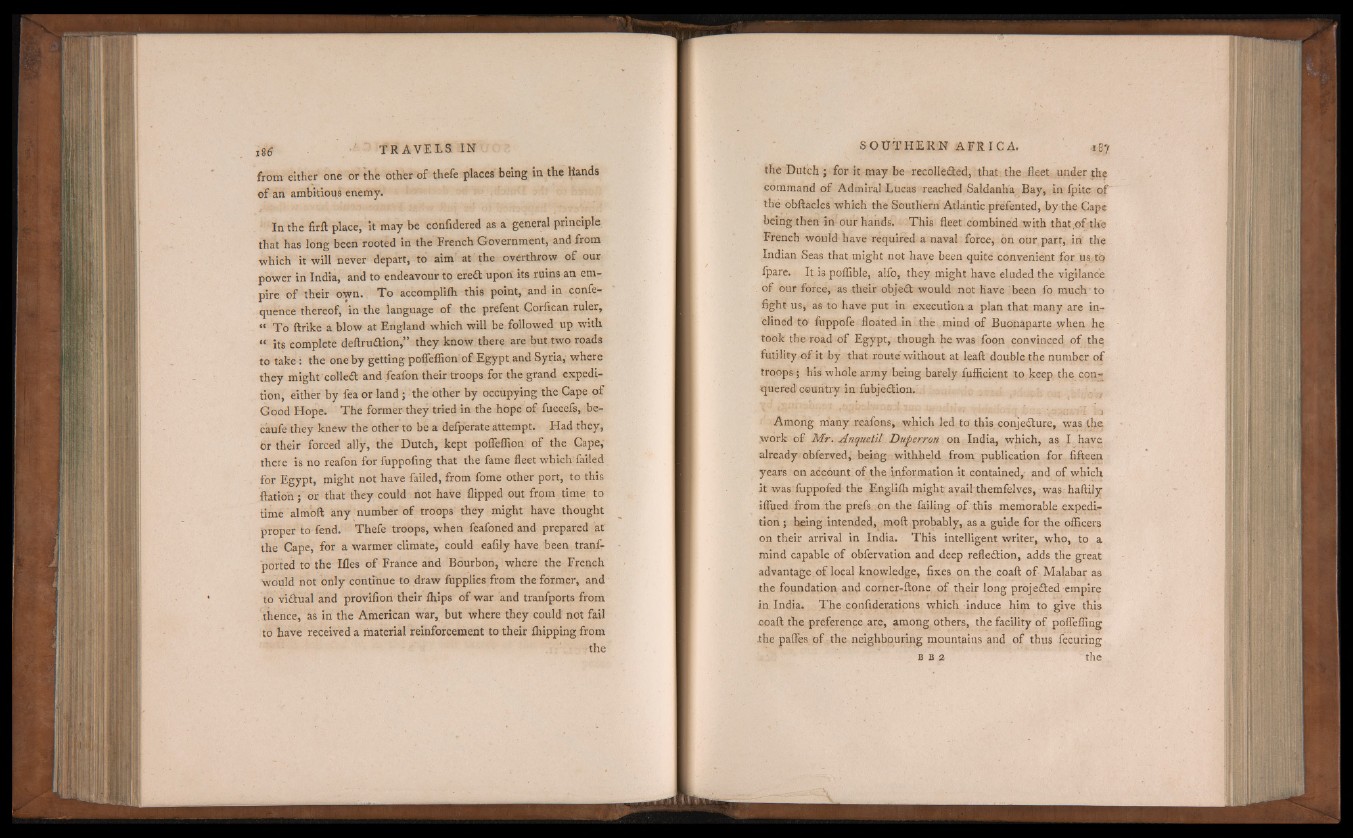
from either one or the other of thefe places being in the Hands
of an ambitious enemy.
In the firft place, it may be cOnfidered as a general principle
that has long been rooted in the French Government, and from
which it will never depart, to aim at the overthrow of our
power in India, and to endeavour to ere£t upon its ruins an empire
of their own. To accompliih this point, and in confe-
quence thereof, in the language of the prefent Corfican ruler,
“ To ftrike a blow at England which will be followed up with
“ its complete deftru&lon,” they know there are but two roads
to take: the one by getting pofieffion of Egypt and Syria, where
they might colled and feafon their troops for the grand expedition,
either by fea or land ; the other by occupying the Cape of
Good Hope. The former they tried in the hope of fuccefs, be-
caufe they knew the other to be a defperate attempt. Had they,
or their forced ally, the Dutch, kept pofleffion of the Cape,'
there is no reafon for fuppofing that the fame fleet which failed
for Egypt, plight not have failed, from fome other port, to this
Ration; or that they could riot have flipped out from time to
time almoft any number of troops they might have thought
proper to fend. Thefe troops, when feafoned and prepared at
the Cape, for a warmer climate, could eafily have been tranf-
ported to the Ifles of France and Bourbon, where the French
would not only contiriue to draw fupplies from the former, and
to viftual and provifion their ihips of war and tranfports from
thence, as in the American war, but where they could not fail
to have received a material reinforcement to their ihipping from
the
the Dutch ; for it may be recollefted, that the fleet under the
command of Admiral Lucas reached Saldanha Bay, in fpite of
the obftacles which the Southern Atlantic prefented, by the Cape
being then in our hands. This fleet combined with that ,of the
French would have required a naval force, on our part, in the
Indian Seas that might not have been quite convenient for us to
lpare. It is poffible, alfo, they might have eluded the vigilance
of our force, as their obje£t would not have been fo much to
fight us, as to have put in execution a plan that many are inclined
to fuppofe floated in the mind of Buonaparte when he
took the road of Egypt, though, he was foon convinced of the
futility of it by that route without at leaft double the number of
troops ; his whole army being barely fufficient to keep the conquered
country in fubjedtion.
. • .. >
Among many reafons, which led to this conjecture, was the
work of Mr. Anquetil Duperron on India, which, as I have
already obferved, being withheld from publication for fifteen
years on account of the information it contained, and of which
it was fuppofed the Englilh might avail themfelves, was haftily
iffued from the prefs on the failing of. this memorable expedition
; being intended, moil probably, as a guide for the officers
on their arrival in India. This intelligent writer, who, to a
mind capable of obfervation and deep refle&ion, adds the great
advantage of local knowledge, fixes on the coaft of- Malabar as
the foundation and corner-ftone, of their long projefted empire
in India. The confiderations which induce him to give this
coaft the preference are, among others, the facility of pofleffing
the paffes of the neighbouring mountains and of thus fecuring
B B 2 the